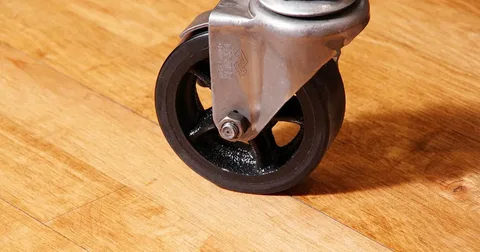In India’s warehouses, hospitals, retail spaces, and factories, caster wheels / castor wheels and trolley wheels are essential for material handling. However, one major challenge faced by many businesses is floor damage caused by trolley wheels. Scratches, cracks, dents, and black streaks not only reduce floor life but also increase maintenance costs. By choosing the right wheels and following best practices, Indian businesses can protect their flooring and ensure smooth operations.
Here’s a comprehensive guide to avoiding floor damage from caster wheels:
-
Choose the Right Wheel Material
Floor damage often comes from using the wrong wheel material.
Recommendations: – Polyurethane wheels – Ideal for epoxy, tiles, and marble floors. Soft enough to prevent scratches but strong enough for industrial loads. – Elastic rubber/Thermoplastic Rubber wheels – Perfect for hospitals and hotels, offering silent and floor-friendly movement. – Nylon Wheels and cast iron wheels – Suitable only for rugged concrete or outdoor use, as they can damage delicate floors.
Tip: Avoid using metal wheels on epoxy or marble floors in Indian facilities.
-
Monitor Load Capacity
Overloaded trolleys exert excessive pressure on floors, causing cracks and dents.
Checklist: – Always calculate the safe load per wheel. – Use heavy-duty Cast polyurethane or Cast Nylon wheels for high loads. – Train staff not to exceed trolley capacity.
-
Inspect Wheel Treads Regularly
Worn or damaged treads act like sandpaper on floors.
Checklist: – Inspect wheels for cuts, cracks, or flat spots. – Replace damaged wheels immediately. – Rotate trolleys with multiple wheels to balance wear.
-
Maintain Clean Floors and Wheels
Dirt, stones, or metal chips trapped in wheels can scratch flooring.
Best Practices: – Sweep floors daily in warehouses and retail stores. – Clean trolley wheels weekly to remove embedded debris. – In hospitals, disinfect wheels daily for hygiene and floor protection.
-
Use Larger Diameter Wheels
Smaller wheels concentrate pressure on a small area, increasing the risk of floor dents.
Tip: For sensitive floors, choose larger polyurethane or rubber wheels that distribute weight more evenly.
-
Check Brake Systems
Dragging brakes across the floor can leave marks and scratches.
Checklist: – Test brakes regularly. – Ensure brakes release fully before moving trolleys. – Replace faulty brake pads.
-
Floor-Specific Guidelines
- Epoxy Floors: Use polyurethane or thermoplastic rubber wheels.
- Tiles/Marble: Use elastic rubber wheels to prevent cracks.
- Concrete: Nylon or cast iron wheels are acceptable.
- Outdoor Surfaces: Pneumatic rubber wheels work best.
-
Adopt Preventive Maintenance
Preventive care reduces both wheel and floor damage.
Schedule: – Weekly: Clean wheels and inspect treads. – Monthly: Lubricate bearings and check mounting hardware. – Quarterly: Replace worn wheels.
Conclusion
Floor repairs in India can be expensive, especially for epoxy-coated warehouses or marble hospital floors. By selecting the right caster wheels and trolley wheels, monitoring load capacity, and following regular maintenance, businesses can prevent costly floor damage.
Pro Tip for Indian Businesses: Always consult with wheel experts to match wheel type with floor conditions. Choosing ISO-certified, floor-friendly castor wheels will protect your investment in both equipment and flooring.



